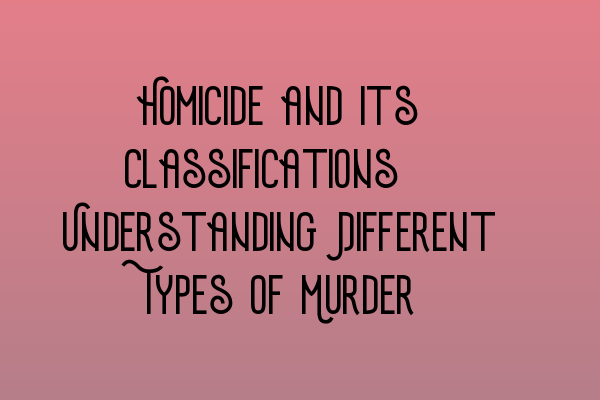Homicide and its Classifications: Understanding Different Types of Murder
When it comes to criminal law, few crimes are as serious and devastating as homicide. Homicide refers to the act of
unlawfully causing the death of another person. This article aims to delve deeper into the different types of murder
that can be classified under the umbrella of homicide and provide a better understanding of their legal implications.
1. First-Degree Murder
First-degree murder is the most serious type of murder and is often premeditated and deliberate. It involves the
intentional killing of another person with malice aforethought, meaning the offender had the intent to kill or cause
serious harm. The penalties for first-degree murder are severe, including life imprisonment or even the death penalty in
some jurisdictions. For a comprehensive guide on UK business regulations, check out our Business Regulations in the UK: A Comprehensive Overview article.
2. Second-Degree Murder
Second-degree murder involves an intentional killing as well, but without the element of premeditation. It is often
referred to as a crime of passion, where the offender acts impulsively and without prior planning. Though the intent to
cause harm or death is present, it lacks the level of malice aforethought required for first-degree murder. Second-degree
murder convictions typically carry significant prison sentences.
3. Voluntary Manslaughter
Voluntary manslaughter, also known as manslaughter, occurs when the offender intentionally causes the death of another
person, but under circumstances that mitigate the severity of the crime. These circumstances may include sudden provocation,
imperfect self-defense, or the heat of passion. While the offender still intended to cause harm or death, the mitigating
factors reduce the culpability and result in a lesser charge compared to murder.
4. Involuntary Manslaughter
Involuntary manslaughter refers to unintentional killings that occur due to reckless or negligent conduct. The offender’s
actions may not have been intended to cause harm, but they created a high risk of death or serious injury. Involuntary
manslaughter is often seen in cases such as driving under the influence or medical malpractice.
5. Felony Murder
Felony murder is a unique category of murder where a person is held responsible for any death that occurs during the
commission of a felony. Even if the death was not intended or directly caused by the offender, they can still be charged
with felony murder. This legal theory is based on the principle that if a person engages in a dangerous felony and a death
occurs as a result, they should be held accountable for the consequences.
If you’re an aspiring solicitor preparing for the SQE exam, be sure to check out our articles on Preparing for the SQE Exam: Strategies and Resources for Success and SQE Workshops and Webinars: Accelerate Your Exam Preparation to enhance your study
materials and boost your chances of success.
Understanding the different classifications of homicide is crucial in the field of criminal law. It helps to determine the
appropriate charges, penalties, and defenses that may apply in a murder case. For UK solicitors, having a comprehensive
understanding of homicide and its classifications allows for effective representation and defense of their clients.
If you require legal assistance or advice regarding homicide cases or any other criminal law matters, please don’t hesitate
to contact our experienced solicitors at SQE Criminal Law & Practice Law UK. We are here to provide you with the expert
guidance and support you need.
For more insights into Delaware corporate law, check out our article on Delaware Corporate Law for UK Solicitors: Key Insights and Practices. If you’re planning to start
a business as a UK entrepreneur, our guide on LLC Formation Made Simple: Step-by-Step Guide for UK Entrepreneurs provides valuable information on the
process.
